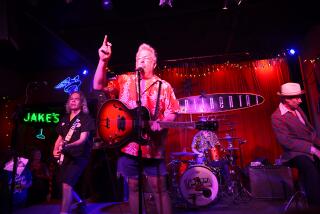Appreciation: Remembering Rod McKuen, the accidental hipster
I was with an acquaintance -- a music expert who, like me, is in his early 40s -- when I heard Rod McKuen had passed away at 81. “The cheesy easy-listening music guy?” he asked.
His assessment is not exactly incorrect. It is undeniable that McKuen’s many albums of the 1960s and ‘70s are now seen as cheesy artifacts of a bygone era, dusty LPs with sentimental covers found in the packed bins of seemingly every Goodwill across America (go ahead, try not to find a copy of 1967’s “The Sea” or 1974’s “Alone” at your nearest thrift store).
And the same goes for his volumes of best-selling poetry -- or “doggerel,” in the words of several highbrow critics who were tasked with reviewing them when they came out and sold thousands of copies. Like fellow singer Jewel’s astonishingly popular 1999 book “A Night Without Armor,” the lyrical work of McKuen can be regularly snapped up for 50 cents a piece in garage sales across the land.
For some people of my generation, however, there are other, less obvious, dimensions to McKuen, his work and the artifacts he left behind.
In the early and mid-1990s -- before the Internet hijacked the archiving and curation of all popular culture -- McKuen’s spoken word records were a staple of a certain strand of hipster culture. His albums, like a lot of the flotsam of the ‘60s and ‘70s that could still be found fairly easily in vintage stores in those pre-EBay days, were collected and played in retro-decorated “bachelor pads.”
His new fans were part of an underground network of devotees of cultural obscurities, the kind of people both lampooned and lovingly depicted in the early work of cartoonist Dan Clowes. These were folks who ordered things from the prized AMOK catalog (shipped from the Los Feliz/Silver Lake headquarters) and read about the far-out McKuen (and eccentric German singer Heino, among many others) in the “Incredibly Strange Music” books released by RE:Search publications in San Francisco.
Even controversial avant-gardists such as NON’s Boyd Rice and bona-fide punks such as Richard Hell were once hip to McKuen. Rice recorded McKuen’s “Seasons in the Sun” with his witchy pop band Spell. Hell’s most famous track with his band the Voidoids, “Blank Generation,” is an homage to “The Beat Generation,” a 1959 novelty single released by McKuen and vocalist Bob McFadden. The latter track was a highlight on Rhino Records’ influential 1992 CD box set “The Beat Generation,” a staple of with-it dorm rooms and apartments in the mid-1990s, as was “The Mummy” (1959, credited to McFadden and “Dor” -- “Rod” backward) in Halloween mix cassette tapes of the era.
To yet another crowd of music connoisseurs, more interested in rare records and cult performers than in vintage culture and fezzes, the words of McKuen will live on in his translations of the lyrics to Jacques Brel’s songs, as interpreted by crooner-to-the-musically-elitist Scott Walker.
And I’ve seen fans of the serious sounds of William Basinski and Glenn Branca salivate at record fairs over the rare 1959 LP “Beatsville,” McKuen’s first and perhaps best work. “I tried to be a good beatnik,” his (perhaps) tongue-in-cheek bohemian character raps over a coffeehouse jazz beat, “but it’s haaaaaaard.”
“Rod has one of the best record collections I have ever seen,” wrote audio engineer Steve Hoffman on one of the many message boards hosted on his site, which is a magnet for audiophiles. “The entire basement of his mansion is wall-to-wall records. You KNOW a guy has a good collection when the stuff is filed by record label and THEN by record number order. That means they have damn near everything!”
With McKuen, we lost another link to a pre-rock ‘n’ roll era when a jocky guy from Oakland who looked like Fred Armisen’s peroxided character from “Saturday Night Live’s” “The Californians” sketch could reinvent himself as a sensitive jive daddy -- and sell tons of records and books to the masses.
Twitter: @eyecantina
More to Read
The biggest entertainment stories
Get our big stories about Hollywood, film, television, music, arts, culture and more right in your inbox as soon as they publish.
You may occasionally receive promotional content from the Los Angeles Times.






